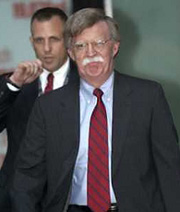|
 |
| The new U.S. Ambassador to the United Nations
John Bolton departs from the U.S. Mission to the U.N. in New York,
August 1, 2005. |
President Bush bypassed the Senate and installed John Bolton as U.S.
ambassador to the United Nations on Monday over protests by Democrats that
the combative critic of the world body would hurt U.S. credibility.
Five months after nominating Bolton, Bush appointed him in a subdued
White House Roosevelt Room ceremony with Bolton beside him and Secretary
of State Condoleezza Rice standing nearby.
"This post is too important to leave vacant any longer, especially
during a war and a vital debate about U.N. reform. So today I've used my
constitutional authority to appoint John Bolton as America's ambassador to
the United Nations," Bush said.
Bolton, 56, will be able to serve until January
2007, when a new Congress is sworn in. Bush gave Bolton a "recess
appointment," taking advantage of a loophole that allows him
to make such appointments when Congress is in
recess
.
Recess appointments are by no means rare but it was believed to be the
first time such an appointment had been made for the job of U.S.
ambassador to the United Nations.
Massachusetts Democratic Sen. Edward Kennedy
called it an abuse of power.
"It's a devious maneuver that evades the constitutional requirement of
Senate consent and only further darkens the cloud over Mr. Bolton's
credibility at the U.N.," he said.
Bush sidestepped the Senate confirmation process
after it became clear he would not be able to overcome Democrats who held up the nomination of the outspoken conservative on charges
he tried to manipulate intelligence and intimidated intelligence analysts to support
his hawkish views as the top State Department diplomat for arms
control.
(Agencies) | 